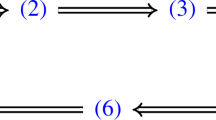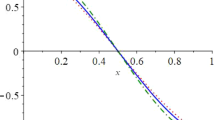Abstract
This work is concerned with certain problems of the theory of well-posed expansions in the class of finitely additive measures and related topics of measure theory itself.
Similar content being viewed by others
REFERENCES
R. A. Aleksandryan and E. A. Mirzakhanyan, General Topology [in Russian], Vysshaya Shkola, Moscow (1979).
A. D. Alexandroff, “Additive set-functions in abstract spaces,” Mat. Sb., 8(58), No. 2, 307–348 (1940).
A. V. Arkhangel'skii, Topological Spaces of Functions [in Russian], Moscow State Univ., Moscow (1989).
R. Aumann and L. Shapley, Values of Non-Atomic Games, Princeton University Press, Princeton (1974).
E. G. Belov and A. G. Chentsov, “Certain properties of two-valued measures and conditions of universal integrability,” Mat. Zametki, 42, No.2, 288–297 (1987).
Yu. I. Berdyshev and A. G. Chentsov, “On equivalence of regularizations in abstract problems with different classes of admissible controls,” Kibern. Sist. Analiz, No. 3, 71–80 (1998).
K. P. S. Bhaskara Rao and M. Bhaskara Rao, Theory of Charges. A Study of Finitely Additive Measures, New York, Academic Press (1983).
P. Billingsley, Convergence of Probabilistic Measures [Russian translation], Nauka, Moscow (1977).
N. Bourbaki, General Topology [Russian translation], Nauka, Moscow (1968).
A. G. Chentsov, “On the question of the well-defined extension of one problem on the choice of the probability density under constraints on the system of mathematical expectations,” Usp. Mat. Nauk, 50, No.5, 223–242 (1995).
A. G. Chentsov, Finitely-Additive Measures and Relaxations of Extremal Problems, Plenum Publishing, New York-London-Moscow (1996).
A. G. Chentsov, Asymptotic Attainability, Kluwer Academic Publishers, Dordrecht-Boston-London (1997).
A. G. Chentsov, “Universal properties of generalized integral constraints in the class of finitely additive measures,” Funct. Differential Equations, 5, Nos. 1–2, 69–105 (1998).
A. G. Chentsov, “Two-valued measures on the set semialgebra and certain applications to infinite-dimensional mathematical programming problems,” Kibernetika, No. 6, 72–76 (1998).
A. G. Chentsov, “Finitely additive measures and minimization problems,” Kibernetika, No. 3, 67–78 (1988).
A. G. Chentsov, “On approximation of asymptotic attainability domains,” Nonsmooth and Discontinuous Problems of Control and Optimization, In: Proc. volume from IFAC Workshop, Chelyabinsk, Russia, 17–20 June 1998, Pergamon Press (1998), pp. 1–12.
A. G. Chentsov, “On the question on the well-defined extension of certain unstable control problems with integral constraints,” Izv. Akad. Nauk, Ser. Mat., 63, 185–223 (1999).
A. G. Chentsov, “Two-valued measures as general elements: the problem of extension of the system of conditions,” Dokl. Ross. Akad. Nauk, 374, No.5, 611–614 (2000).
A. G. Chentsov, “Certain properties of two-valued measures and representation of limits according to the filter,” Dokl. Ross. Akad. Nauk, 370, No.5, 595–598 (2000).
A. G. Chentsov, “Topological constructions of extensions and representations of attraction sets,” Tr. Mat. Inst. Ross. Akad. Nauk., Spets. Vyp. 1 (2000), pp. 35–60.
A. G. Chentsov, “Two-valued measures: finite additivity and countable additivity,” Funct. Differential Equations, Nos. 3–4, 231–257 (2000).
A. G. Chentsov, “Finitely Additive Measures and Extension Constructions,” Atti Sem. Mat. Fis. Univ. Modena, II, 531–545 (2001).
A. G. Chentsov, “On the question on the construction of well-defined extensions in the class of finitely additive measures,” Izv. Vyssh. Uchbn. Zaved., Ser. Mat., 2, 58–80 (2002).
A. G. Chentsov, “Two-valued measures and zero-dimensional topologies,” Funct. Differential Equations, 9, Nos. 1–2, 71–89 (2002).
A. G. Chentsov, “On measurable spaces admitting non-Dirac finitely additive (0,1)-measures,” Dokl. Ross. Akad. Nauk, 384, No.5, 607–618 (2002).
A. G. Chentsov, “On one class of non-Dirac finitely additive (0,1)-measures,” in: Functional Differential Equations [in Russian], (2002), pp. 238–252.
A. G. Chentsov and T. Yu. Kashirtseva, “Generalized trajectories of linear control systems with discontinuous coefficients by the controls,” Vestnik Chelyabinsk. Univ., No. 2 (1999).
A. G. Chentsov and S. I. Morina, Extensions and Relaxations, Kluwer Academic Publishers, Dordrecht-Boston-London (2002).
A. G. Chentsov and V. E. Pak, “On the extension of the nonlinear optimal control problem with nonstationary phase restrictions,” Nonlinear analysis, Theory, Methods Applications, 26, 383–394 (1996).
J. P. R. Christensen, “Finitely additive measure defined on sigma-field is automatically countably additive,” Atti Sem. Mat. Fis. Univ. Modena, 2, 509–511, (2001).
R. J. Daffin, “Infinite rograms,” in: Linear Inequalities and Adjunct Problems [Russian translation], Moscow (1959), pp. 263–267.
L. E. Dubbins and L. J. Savage, Inequalities for Stochastic Processes. How to Gamble If You Must, Dover, New York (1976).
N. Dunford and G. T. Shwartz, Linear Operators. General Theory [Russian translation], Moscow (1962).
V. A. Dykhta and O. N. Samsonyuk, Optimal Impulse Control with Applications, Fizmatlit, Moscow (2000).
I. Ekeland and R. Temam, Convex Analysis and Variational Problems, North-Holland, Amsterdam (1976).
R. Engelking, General Topology, PWN, Warszawa (1983).
I. I. Eremin, V. D. Mazurov, and N. N. Astaf'ev, Nonproper Problems of Linear and Convex Programming [in Russian], Nauka, Moscow (1983).
V. D. Erokhin, “A note on measure theory,” Usp. Mat. Nauk, 16, No.3, 175–180.
V. V. Fedorchyuk and V. V. Filippov, General Topology. Basic Constructions [in Russian], Moscow Univ., Moscow (1988).
R. V. Gamkrelidze, “On sliding optimal regimes,” Dokl. Akad. Nauk SSSR, 143, 1243–1245 (1962).
R. V. Gamkrelidze, “On some extremal problem in the theory of differential equations,” SIAM J. Control, No. 3, 106–128 (1965).
R. V. Gamkrelidze, Foundations of Optimal Control [in Russian], Izd. Tbilissk. Univ., Tbilisi (1975).
W. Hildebrandt, Nucleus and Equilibrium in Large Economy [Russian translation], Nauka, Moscow (1986).
E. G. Gol'shtein, Duality Theory in Mathematical Programming and Its Applications [in Russian] Nauka, Moscow (1971).
A. D. Ioffe and V. M. Tikhomirov, Theory of Extremal Problems [in Russian], Nauka, Moscow (1974).
E. Hewitt and K. Josida, “Finitely additive measures,” Trans. Amer. Math. Soc., 72, No.1, 46–66 (1995).
J. L. Kelley, General Topology [Russian translation], Nauka, Moscow (1981).
N. N. Krasovskii, Motion Control Theory [in Russian], Nauka, Moscow (1968).
N. N. Krasovskii, Control of a Dynamical System. Problem on the Minimum of the Guaranteed Result [in Russian], Nauka, Moscow (1985).
N. N. Krasovskii and A. I. Subbotin, Positional Differential Games [in Russian], Nauka, Moscow (1974).
K. Kuratowsky and A. Mostowsky, Theory of Sets [Russian translation], Mir, Moscow (1970).
B. M. Miller, “Optimization of dynamical systems with generalized control,” Avtom. Telemekh., No. 6, 23–34 (1986).
J. Nevier, Mathematical Foundations of Probability Theory [Russian translation], Mir, Moscow (1969).
V. E. Pak and A. G. Chentsov, “On the question on the regularization of the function of asymptotic value of the control problem under the perturbation of the set of initial positions,” Differents. Uravn., 30, No.11, 1939–1949 (1994).
K. Parthasarathy, Introduction to Probability and Measure, McMillan Company of India, Dehli (1980).
Sh. S. Phakadze, “Expansions of measure.” Tr. Tbilissk. Mat. Inst., Tbilisi, 29, 121–145, (1968).
L. S. Pontryagin, Ordinary Differential Equations [in Russian], Nauka, Moscow (1965).
L. S. Pontryagin, V. G. Boltyanskii, R. V. Gamkrelidze, and E. F. Mishchenko, Mathematical Theory of Optimal Processes [in Russian], Nauka, Moscow (1983).
A. Robertson and W. Robertson, Topological Vector Spaces [Russian translation], Mir, Moscow (1967).
A. M. Samoilenko and N. A. Perestyuk, Differential Equations with Pulse Action [in Russian], Vishcha Shkola, Kiev (1987).
Z. Semadeni, Spaces of Continuons Functions, PWN, Warszawa (1971).
V. P. Serov and A. G. Chentsov, “On one construction of extension of the control problem with integral constraints,” Differents. Uravn., 26, No.4, 607–617 (1988).
R. Sikorsky, Boolean Algebras [Russian translation], Mir, Moscow (1969).
A. I. Subbotin and A. G. Chentsov, Optimization of a Guarantee in Control Problems [in Russian], Nauka, Moscow (1981).
J. Warga, Optimal Control of Differential and Functional Equations [Russian translation], Nauka, Moscow (1977).
J. Warga, “Relaxed variational problems,” J. Math. Anal. Appl., 4, 112–127 (1962).
L. Yang, Lectures on the Calculus of Variation and Optimal Control Theory, Saunders, Philadelphia (1969).
L. C. Young, “Generalized surfaces in the calculus of variations, I,” Ann. Math., 43, 84–103 (1942).
L. C. Young, “Generalized surfaces in the calculus of variations, II,” Ann. Math., 43, 530–544 (1942).
D. S. Zavalishchin and S. T. Zavalishchin, Dynamic Optimization of Flow [in Russian], Fizmatlit, Moscow (2002).
S. T. Zavalishchin and A. N. Sesekin, Impulse Processes. Models and Applications [in Russian], Nauka, Moscow (1991).
A. I. Zhdanyuk, “Ergodic theorems for nonsmooth Markov processes,” in: Topological Spaces and Their Mappings [in Russian], Riga (1981).
A. I. Zhdanyuk, “Gamma-compactification of measurable spaces,” Sib. Mat. Zh., 44, No.3 (259), 587–605 (2003).
Author information
Authors and Affiliations
Additional information
__________
Translated from Sovremennaya Matematika i Ee Prilozheniya (Contemporary Mathematics and Its Applications), Vol. 17, Optimal Control, 2004.
Rights and permissions
About this article
Cite this article
Chentsov, A.G. Finitely Additive Measures and Extensions of Abstract Control Problems. J Math Sci 133, 1045–1206 (2006). https://doi.org/10.1007/s10958-006-0030-0
Issue Date:
DOI: https://doi.org/10.1007/s10958-006-0030-0




